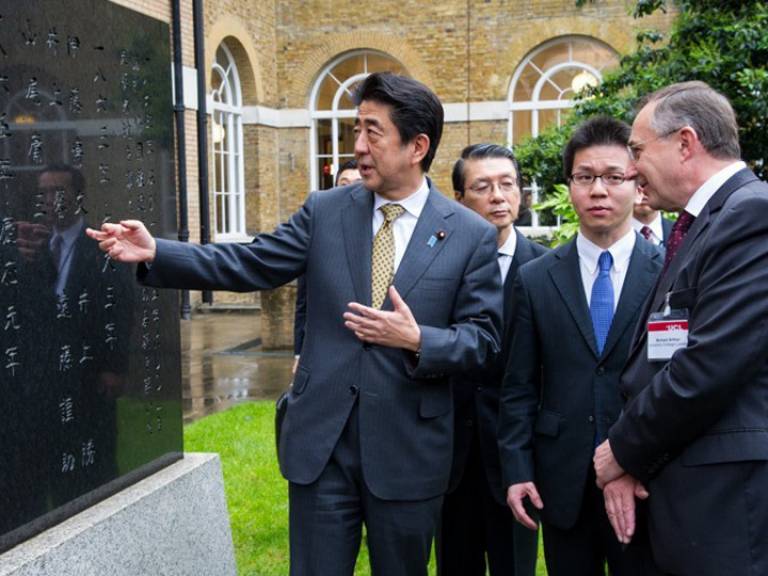Japan's PM reaffirms close ties with UCL in meeting with Provost
27 September 2017
Japan's Prime Minister Shinzo Abe has thanked UCL for its role in helping to educate students from his country dating back 150 years to the Choshu Five in the 19th century.

His comments came in a one-to-one meeting on Sunday with UCL President & Provost Professor Michael Arthur during a two-week visit to Japan by a UCL delegation to forge new ties and build on historical links.
Mr Abe, who spared the time to meet the provost despite being in the midst of a snap election he has just called, expressed his appreciation of UCL's strength in medicine and was pleased to see collaborations between UCL and Japan in these areas.
During the visit the Provost and his delegation which includes experts on dementia and disaster management are meeting with officials and academics from Tokyo, Tohoku, Kyoto and Osaka universities.
There have also been meetings with leading companies Eisai Co. Ltd. and Hamamatsu Photonics KK, both close industrial research partners and significant donors to UCL, and with the Governor of Fukushima Prefectural Government. UCL has been working in Fukushima since 2011 when it was hit by the triple disaster of earthquake, tsunami and nuclear meltdown.
Mr Abe spoke of his fond memories of visiting UCL in 2014 where he was pictured next to the Japan monument in the South Cloisters where the names of the Choshu Five are engraved on the granite next to a Japanese waka (poem).
The Provost told Mr Abe that the Choshu Five embodied the values of UCL of openness, internationalisation, people to people exchanges and contributing to society. The meeting took place during the Science and Technology in Society (STS) forum in Kyoto.
An alumni reception was also held at the Ambassador's residence in Tokyo, to celebrate UCL's close and continued relationship with Japan going back to the Choshu Five and Satsuma group.
After leaving UCL some 150 years ago, the Choshu Five went on to become the founding fathers of modern Japan. They included Hirobumi Ito, who became Japan's first Prime Minister and is otherwise known as 'the Father of the Japanese Constitution' and 'the Father of parliamentary government in Japan'.
The others were Kaoru Inoue, who became Japan's first Foreign Minister, also known as 'the Father of modern Japanese diplomacy', Yozo Yamao, 'the Father of Japanese engineering', Masaru Inoue, 'the Father of Japanese railways', and Kinsuke Endo, 'the Father of the modern Japanese mint'.
The Choshu Five were followed soon after, in 1865, by a group of 19 students and supervisors, mostly from the Satsuma region. Members of this so-called Satsuma group went on to be successful diplomats, bring in compulsory education for all and founded Japan's first modern factory.
UCL is now the second biggest recruiter of Japanese students in the UK and the number of Japanese students welcomed every year has remained fairly consistent over the past decade. There are currently over 150 students from Japan enrolled at UCL (2016/17).
Among those in the delegation are Gill Livingston, UCL professor of psychiatry of older people, Nick Tyler, Chadwick Professor of Civil Engineering, Ed Wild, principal clinical research associate at Institute of Neurology, Professor Claudia Mauri (immunology), Professor Shin-Ichi Ohnuma (opthalmology and UCL's Japan ambassador) and professor Peter Sammonds (disaster management).
 Close
Close

